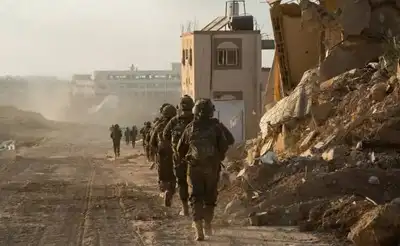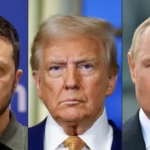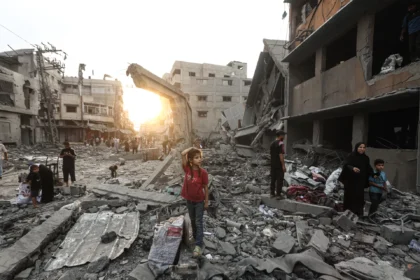UN Puts Israel and Russia ‘On Notice’ Over Reported Sexual Violence in Conflict Zones — A Comprehensive Global Analysis
The United Nations has formally put Israel and the Russian armed forces “on notice” following allegations of sexual violence committed in conflict zones. This move, unprecedented in its direct naming of two major global military powers, comes as part of the UN’s annual review process under its mandate to monitor grave violations against civilians in armed conflicts.
According to the UN, the notice is a preliminary step that signals the possibility of including these forces in the Secretary-General’s official list of parties credibly suspected of committing such violations. The consequences of such a listing could be diplomatic, reputational, and political, affecting bilateral relations, aid agreements, and international legal proceedings.
The Nature of the Allegations
The allegations concern sexual violence in conflict settings, a category of war crime under international humanitarian law. Such acts are prohibited by the Geneva Conventions, the Rome Statute of the International Criminal Court (ICC), and multiple UN resolutions, including Security Council Resolution 1820, which explicitly recognizes sexual violence as a tactic of war.
Against Israel
Reports, including those from humanitarian agencies, allege that incidents occurred in Gaza and the occupied Palestinian territories during military operations. While Israel has rejected these allegations as “politically motivated,” rights organizations argue that credible evidence exists and should be independently investigated.
Against Russia
The allegations against Russian armed forces are linked to operations in Ukraine, with testimonies collected by both local and international human rights bodies. The UN has indicated that the nature of the accusations aligns with patterns observed in other war zones where sexual violence was used as a weapon of intimidation.
The UN ‘On Notice’ Mechanism Explained
The “on notice” step is a procedural warning issued by the Office of the Special Representative of the Secretary-General on Sexual Violence in Conflict. It means:
- The accused party is under heightened monitoring.
- If credible evidence is confirmed, the party could be listed in the Secretary-General’s annual report on conflict-related sexual violence.
- Being listed carries international stigma and may trigger sanctions or restrictions from UN member states.
This mechanism has historically been applied to non-state armed groups and forces in smaller conflicts. Applying it to major powers like Israel and Russia is diplomatically sensitive and could reshape UN precedent.
Immediate Political Reactions
Israel’s Response
Israeli officials have called the UN’s notice “unfounded and defamatory,” emphasizing that the Israel Defense Forces (IDF) have strict codes of conduct and that any violations are investigated domestically. Israel’s foreign ministry accused the UN of bias in its approach to Middle Eastern conflicts.
Russia’s Response
The Kremlin dismissed the notice as “another political instrument of Western-aligned institutions,” framing it as part of a broader information warfare campaign. Russia reiterated that its operations in Ukraine are conducted under the laws of armed conflict.
UN’s Clarification
UN representatives stressed that the notice is not a conviction or finding of guilt but a call for transparency, cooperation in investigations, and preventive measures to protect civilians.
International Law and the Definition of Sexual Violence in Conflict
Under Article 7 and Article 8 of the Rome Statute, acts such as rape, sexual slavery, enforced prostitution, forced pregnancy, and sexual mutilation committed in conflict can constitute war crimes or crimes against humanity.
The legal threshold involves:
- Widespread or systematic nature of the acts.
- Link to the conflict — the acts must occur in connection with and for purposes related to the armed conflict.
- Perpetrator intent — deliberate targeting or condoning of such acts.
The International Criminal Tribunal for Rwanda (ICTR) and the International Criminal Tribunal for the former Yugoslavia (ICTY) established landmark precedents in prosecuting sexual violence as a central war crime, not merely a collateral act.
The Geopolitical Stakes
Placing Israel and Russia in the same category under this notice is geopolitically significant:
- Diplomatic Sensitivity: Both nations hold substantial influence in the UN system, and both have veto power in the Security Council (Russia as a permanent member, Israel through alliances with the US).
- Strategic Repercussions: Accusations of war crimes can undermine military legitimacy, affect arms trade relationships, and reduce soft power.
- Public Perception: Domestic narratives in Israel and Russia are likely to frame this as international targeting, while affected populations and advocacy groups may see it as overdue accountability.
The UN’s decision to formally put Israel and Russia “on notice” marks a watershed moment in global conflict accountability. It signals that allegations of sexual violence in war will be scrutinized regardless of the geopolitical stature of the accused.
The United Nations’ decision to place Israel and Russia “on notice” has sparked debates in diplomatic, legal, and humanitarian circles. To understand its potential consequences, we must explore past examples of similar UN notices, how those cases were handled, and the degree to which such actions influenced international accountability.
While the “on notice” mechanism has historically been used against non-state armed groups and militaries in smaller-scale conflicts, it has, on occasion, been applied to governments — often leading to a complex blend of political pushback and humanitarian advocacy.
Historical Precedent: When the UN Issued Similar Notices
1. Democratic Republic of the Congo (DRC) — FARDC (2009, 2013)
The Congolese national army, FARDC, was placed on notice multiple times for alleged mass rapes in conflict zones. In 2013, credible evidence led to their formal listing in the UN’s annual report.
- Outcome: International aid from certain countries was temporarily suspended until reforms and accountability measures were implemented.
- Lesson: External pressure, combined with aid conditionality, can push governments to address violations, though long-term systemic change remains challenging.
2. Myanmar — Tatmadaw Forces (2018)
Following the Rohingya crisis, Myanmar’s military was accused of sexual violence on a large scale. UN investigators found “systematic targeting” of women and girls.
- Outcome: Myanmar faced severe international condemnation, sanctions, and ICC preliminary investigations, but internal accountability remained absent.
- Lesson: UN notice can amplify global scrutiny even if direct enforcement is limited.
3. Sudan — Darfur Conflict (2004–2010)
Sudanese armed forces and allied militias were placed under notice for sexual violence in Darfur. This led to ICC indictments, including against then-President Omar al-Bashir.
- Outcome: While al-Bashir avoided arrest for years, the notice contributed to building the legal case against him.
- Lesson: UN notices can serve as building blocks for future international criminal prosecutions.
4. Bosnia and Herzegovina (1990s)
Though predating the current formal “on notice” mechanism, UN documentation of sexual violence during the Bosnian War laid the foundation for the ICTY to treat rape as a crime against humanity.
- Outcome: The convictions of several Bosnian Serb leaders became landmark legal precedents.
- Lesson: Early documentation is crucial for later legal action.
Patterns from Past Notices
Analyzing past cases reveals consistent themes:
- Heightened International Pressure
Once a notice is issued, NGOs, human rights advocates, and media outlets intensify monitoring and documentation efforts. - Diplomatic Fallout
States under notice often face strained bilateral relations and reduced leverage in international negotiations. - Mixed Compliance
While some militaries implement reforms to avoid formal listing, others dismiss the notice and carry on without cooperation. - Legal Foundation for Future Action
The notice process often becomes part of the evidentiary chain in ICC or domestic war crimes trials.
Why Israel and Russia’s Cases Are Different
Applying the “on notice” mechanism to Israel and Russia presents unique challenges:
- Geopolitical Weight: Russia holds a permanent UN Security Council seat, and Israel has strong diplomatic protection from the United States.
- Global Media Dynamics: Both conflicts — in Ukraine and Gaza — dominate international headlines, increasing public awareness but also polarizing opinion.
- Alliance Politics: Many countries are hesitant to take firm stances that could alienate key security or trade partners.
Historically, the UN’s strongest enforcement measures have been against nations with less geopolitical influence, raising the question: will this notice lead to tangible accountability for Israel and Russia?
Reactions from International Civil Society
Human rights organizations have generally welcomed the notices:
- Amnesty International: Called the step “a critical signal that no state is above accountability.”
- Human Rights Watch: Urged the UN to ensure follow-through and not allow political pressure to dilute the process.
- International Committee of the Red Cross (ICRC): Emphasized the need for impartial investigations to protect civilian dignity.
At the same time, advocacy groups acknowledge that past cases show mixed results — some leading to real reform, others ending in diplomatic stalemate.
Potential Impact on Israel and Russia
Drawing from precedent, possible scenarios include:
- Scenario 1 — Preemptive Reforms: Israel or Russia could introduce visible internal investigations to signal compliance and avoid formal listing.
- Scenario 2 — Political Defiance: Both countries could reject the UN’s authority, leading to prolonged standoffs with minimal practical change.
- Scenario 3 — International Legal Proceedings: The notice may contribute to building future ICC or special tribunal cases, even if enforcement is delayed.
The Power and Limits of a UN Notice
While a UN “on notice” designation does not carry legal force on its own, its influence lies in:
- Shaping diplomatic narratives.
- Triggering sanctions or aid restrictions.
- Encouraging independent fact-finding missions.
- Documenting evidence for future prosecutions.
However, without political will from member states, a notice can become symbolic — a point of public condemnation without direct consequences.
Sexual violence in armed conflict is not merely a human rights violation — it is a war crime under international law. Over the past three decades, the global community has built legal frameworks to address such crimes, but enforcement remains an uphill battle.
In this part, we break down how international law addresses conflict-related sexual violence, the mechanisms for investigation, and why convictions remain rare — even when credible evidence exists.
The Legal Definition of Sexual Violence in Conflict
Under international law, sexual violence in war is recognized under multiple legal instruments:
- Geneva Conventions (1949) — Particularly Common Article 3 and Additional Protocols I & II, which prohibit “outrages upon personal dignity” including sexual violence.
- Rome Statute of the International Criminal Court (1998) — Classifies rape, sexual slavery, forced prostitution, forced pregnancy, enforced sterilization, and other forms of sexual violence as war crimes and crimes against humanity when committed as part of a widespread or systematic attack.
- UN Security Council Resolutions — Resolutions 1820 (2008), 1888 (2009), and 2467 (2019) specifically address sexual violence in conflict and call for accountability.
In short, the law is clear — sexual violence in conflict is not collateral damage; it is a punishable war crime.
The Investigation Process
Investigating such crimes involves a multi-layered approach that is often complex, dangerous, and politically sensitive.
1. Initial Documentation
- Local NGOs, journalists, and humanitarian workers often gather the first testimonies.
- Medical records and witness accounts are crucial but can be destroyed or suppressed in active conflict zones.
2. International Fact-Finding Missions
- UN-appointed commissions or independent experts conduct interviews, forensic analysis, and site visits.
- In high-risk zones like Gaza or occupied Ukrainian territories, access can be denied or heavily restricted.
3. Chain of Evidence
- Preserving the chain of custody for medical and physical evidence is critical for legal admissibility.
- Often, victims fear retaliation and delay reporting — making verification harder.
4. Cooperation from State Authorities
- Without cooperation from the accused state, investigations face obstruction, intimidation of witnesses, and destruction of records.
Why Prosecution is So Difficult
Even when the UN issues a notice and credible evidence exists, bringing perpetrators to justice faces major roadblocks:
A. Political Immunity
High-ranking officials and military leaders often enjoy de facto protection due to political alliances or Security Council vetoes.
B. Fear of Retaliation
Victims and witnesses are often afraid to testify, fearing harassment, imprisonment, or worse.
C. Cultural Stigma
In many societies, survivors of sexual violence face ostracism, which discourages reporting and public testimony.
D. Resource Limitations
Investigations are costly, and conflict zones present logistical nightmares — from safety concerns to forensic capacity.
Case Study: ICC Precedent
The Ntaganda Case (DRC, 2019)
Bosco Ntaganda, a Congolese warlord, was convicted by the ICC for war crimes including rape and sexual slavery of both civilians and child soldiers.
- Key takeaway: The conviction required years of coordinated evidence gathering and survivor protection, showing how long and complex such cases can be.
Israel and Russia — The Road Ahead for Legal Accountability
Applying these frameworks to Israel and Russia highlights major obstacles:
- Israel — As a non-signatory to the Rome Statute, Israel does not recognize ICC jurisdiction over its nationals, though the ICC claims jurisdiction in Palestinian territories.
- Russia — Also not a Rome Statute member, and has formally withdrawn from ICC obligations after the court issued arrest warrants for Russian officials in other cases.
The UN’s “on notice” designation will likely feed into future legal efforts — but without state cooperation, prosecution will be slow, possibly taking decades.
Role of Technology in Evidence Collection
Recent years have seen advancements that could help in these cases:
- Satellite imagery to document destruction of villages where assaults occurred.
- Digital forensics to recover deleted videos or photos from conflict zones.
- Blockchain evidence storage to prevent tampering with records.
Still, technology cannot overcome political unwillingness to prosecute.
The legal architecture to prosecute sexual violence in war exists — the problem is not a lack of law, but a lack of enforcement power when powerful states are involved. As we continue, the central question remains: Will Israel and Russia face the same fate as past states under UN notice, or will geopolitics once again shield them from full accountability?
When the United Nations issues a formal notice accusing a state of war crimes — especially sexual violence in conflict — the matter rarely plays out in the courtroom first. Instead, it unfolds on the world’s geopolitical stage, where alliances, economic interests, and military influence often decide whether justice will even be pursued.
In this part, we examine how global politics can either advance accountability or bury it under layers of diplomacy and veto power.
The UN Security Council — A Double-Edged Sword
The Security Council (UNSC) has the authority to:
- Mandate investigations by international bodies.
- Authorize sanctions or refer cases to the ICC.
- Call for peacekeeping interventions in areas with ongoing human rights abuses.
However, its five permanent members — the United States, Russia, China, the United Kingdom, and France — wield veto power. This means:
- Russia can block any resolution targeting itself.
- The United States could shield Israel from punitive measures, as it has done in past conflicts.
This political reality means many war crime cases stall before they begin.
Israel’s Diplomatic Shield
Israel’s close alliance with the United States and several European nations gives it significant protection in international forums:
- Military Aid & Strategic Cooperation — The U.S. provides billions in military aid, making it unlikely to support sanctions.
- Narrative Framing — Israeli diplomacy often frames allegations as politically motivated or as part of broader anti-Israel sentiment.
- Counterclaims — Israel frequently counters with its own allegations against adversaries, shifting focus from its actions.
Historical Precedent: In 2009, after the UN’s Goldstone Report accused Israel of war crimes in Gaza, the U.S. and several allies dismissed the findings, effectively ending momentum for prosecution.
Russia’s Global Power Play
Russia approaches international accusations with a mix of defiance and alternative alliances:
- Strategic Partnerships — Deep ties with China, Iran, and some African states provide diplomatic cover.
- Control Over Narrative — State-controlled media frames allegations as Western propaganda.
- Withdrawal from ICC — Russia’s official withdrawal from ICC jurisdiction in 2016 was a calculated move to avoid legal entanglement.
Historical Precedent: Following the ICC’s arrest warrant for Russian President Vladimir Putin in 2023 over alleged war crimes in Ukraine, Moscow simply dismissed the court’s legitimacy.
The Role of Middle Powers
Countries like India, Brazil, South Africa, and Türkiye often play balancing roles:
- They avoid direct confrontation with major powers but can influence UN voting blocs.
- Their positions are often shaped by economic ties and defense agreements, rather than purely moral or legal considerations.
In both the Israel and Russia cases, these nations are likely to call for dialogue rather than sanctions, delaying meaningful accountability.
Human Rights vs. Realpolitik
One of the starkest realities in international relations is that human rights enforcement often loses to strategic interests:
- Arms Trade — Many countries supplying weapons to Israel or Russia profit from continued military engagement.
- Energy Dependencies — European states dependent on Russian gas are cautious about fully confronting Moscow.
- Regional Stability Concerns — Some states fear that punishing Israel too harshly could destabilize Middle Eastern alliances.
UN’s ‘Naming and Shaming’ Strategy
When political action is blocked, the UN often resorts to naming and shaming:
- Publishing reports that identify violators.
- Adding countries or groups to annual “List of Shame” reports on children and armed conflict.
- Coordinating with NGOs to pressure governments through public opinion.
However, naming and shaming has mixed results:
- It can galvanize civil society campaigns and sanctions from certain states.
- But it often fails to change the behavior of major military powers.
Possible Diplomatic Outcomes
Based on past patterns, there are three likely scenarios:
- Soft Diplomacy Prevails — Quiet negotiations lead to “investigations” controlled by the accused states, producing minimal consequences.
- Limited Sanctions — A few states impose targeted sanctions, but no global enforcement follows.
- Prolonged Legal Deadlock — Evidence is collected over years, but without cooperation from the accused, cases never reach court.
Why This Matters for Global Justice
If Israel and Russia face no significant consequences despite a UN notice, it risks sending a dangerous signal:
Powerful nations can commit war crimes without fear of accountability, so long as they have the right allies.
This undermines decades of progress in building an international rule of law, potentially emboldening future violations.
Also Read : Supreme Court Defends Bihar Voter List Revision as ‘Not Anti-Voter’—Clarifies Document Norms








